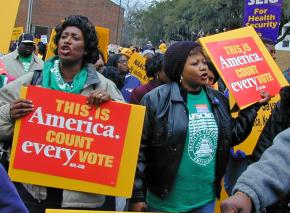Kicked out of house and vote
reports on revelations of a Republican scheme to take away the vote from people facing foreclosure.
HAVE YOU lost your home? If you live in Macomb County, Mich., you could lose your right to vote, too.
That, at least, is the plan of James Carabelli, chairman of the county Republican Party organization.
Northeast of Detroit, Macomb County is considered a key "swing county" in a swing state in the upcoming presidential election. According to a recent article on the Michigan Messenger Web site, an independent news site, Carabelli told reporter Eartha Jane Melzer, "We will have a list of foreclosed homes and will make sure people aren't voting from those addresses."
The plan, if true, would be an attempt by Republicans to classify some voters as being ineligible on the basis of not being "true residents." Such a plan would disproportionately affect African American voters, who make up a large percentage of victims of the foreclosure crisis in Macomb County. As Melzer explained:
Challenging all voters registered to foreclosed homes could disrupt some polling places, especially in the Detroit metropolitan area. According to the real estate Web site RealtyTrac, one in every 176 households in Wayne County, metropolitan Detroit, received a foreclosure filing during the month of July.
In Macomb County, the figure was one household in every 285, meaning that 1,834 homeowners received the bad news in just one month. The Macomb County foreclosure rate puts it in the top 3 percent of all U.S. counties in the number of distressed homeowners.

The Republican tactic is illegal, say experts "You can't challenge people without a factual basis for doing so," said J. Gerald Hebert, a former voting rights litigator for the U.S. Justice Department. "I don't think a foreclosure notice is sufficient basis for a challenge, because people often remain in their homes after foreclosure begins, and sometimes are able to negotiate and refinance."
Of course, the legality of such tactics hasn't stopped Republicans before. In 2000, they used dirty tricks to disenfranchise Black voters--who are more likely to vote Democratic--in Florida and elsewhere.
Ominously, Carabelli reportedly told Meltzer that the Republican Party was training people as election challengers to "make sure that [voters] are who they say who they are."
In 2000, of course, the Republican Party used various dirty tricks to strike voters from the roles in states like Florida--including using list of felons' names to bar people with the same or similar names from voting.
As Melzer noted, "The Macomb GOP's plans are another indication of how John McCain's campaign stands to benefit from the burgeoning number of foreclosures in the state. McCain's regional headquarters are housed in the office building of foreclosure specialists Trott & Trott. The firm's founder, David A. Trott, has raised between $100,000 and $250,000 for the Republican nominee."
As David Lagstein, an organizer with Michigan Association of Community Organizations for Reform Now (ACORN) told Melzer, "You would think they would think, 'This is going to look too heartless.'"
AFTER THE story about the plan spread, Carabelli denied it, telling the Associated Press that "The story is not true, and I never said those things."
But Eric Doster, a former attorney for the Michigan Republican Party and a lawyer who plans to represent GOP election challengers on Election Day, told Melzer that "while he is unfamiliar with plans to use foreclosure lists to challenge voters, he does expect party volunteers to challenge voters in other ways."
One of those ways, Doster acknowledged, may include a practice known as "vote caging"--a practice also used in previous elections to disenfranchise voters.
For example, in the 2004 presidential election, according to BBC reporter Greg Palast, the Florida Republican Party compiled the names and addresses of hundreds of voters in predominantly Black and traditionally Democrat areas of Jacksonville, Fla. According to Palast:
Here's how the scheme worked: The RNC mailed these voters letters in envelopes marked, "Do not forward," to be returned to the sender. These letters were mailed to servicemen and women, some stationed overseas, to their U.S. home addresses. The letters then returned to the Bush-Cheney campaign as "undeliverable."
The lists of soldiers of "undeliverable" letters were transmitted from state headquarters, in this case, Florida, to the RNC in Washington. The [Republican] party could then challenge the voters' registration and thereby prevent their absentee ballots being counted.
On September 12, members of Jobs with Justice and ACORN held a protest outside of McCain's regional Midwest headquarters and attempted deliver a letter to the campaign, calling for the resignation of Carabelli (the campaign staff refused to accept the letter).
As Nancy Hemminger, an ACORN member whose home is in the process of being foreclosed on, told reporter Minehaha Forman, "I'm in a two-[adult] working home. My husband works full time and I work full time...It's not 'I'm not trying to pay my bills.' It's 'I don't have the money anymore to pay my bills.'...
"I'm 43 years old. I've had the right to vote since I was 18. I've done nothing...to cause me to have my right taken away."


